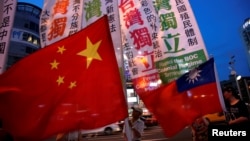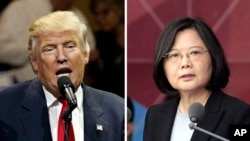China's military has become alarmed by what it sees as U.S. President-elect Donald Trump's support of Taiwan and is considering strong measures to prevent the island from moving toward independence, sources with ties to senior military officers said.
Three sources said one possibility being considered was conducting war games near the self-ruled island that China considers as a breakaway province. Another was a series of economic measures to cripple Taiwan.
It was not clear whether any decisions had been taken, but the sources, who spoke on condition of anonymity, said the Taiwan issue had become a hot topic within the upper echelons of China's People's Liberation Army (PLA) in recent weeks.
Trump, due to take office on January 20, angered Beijing last month by speaking to Taiwan's president by telephone, breaking decades of precedent and casting doubt on his incoming administration's commitment to Beijing's "one China" policy.
Crossing a ‘red line’
Beijing fears this could embolden supporters of independence in Taiwan.
"If Trump challenges 'one China' after becoming president, this would cross our red line," said another source, who has ties to China's leadership.
China's Defense Ministry declined to comment. An official at the ministry's news department said China's position was clearly laid out in the 2005 Anti-Secession Law, which authorizes the use of force against Taiwan in the event China judges it to have
seceded.
Asked about any possible aggressive moves from China, Taiwan Defense Ministry spokesman Chen Chung-shi said:
"We are fully prepared, and plan for the worst while preparing for the best."
China claims self-ruled Taiwan as its sacred and inviolable territory and is deeply suspicious of President Tsai Ing-wen, whose ruling Democratic Progressive Party espouses the island's independence.
Tsai, who took power this year, says she wants to maintain peace with China, but China is unconvinced.
Tsai said on Saturday that Taiwan will be "calm" when facing issues to do with China, but uncertainties next year will test the self-ruled island and its national security team.
Beijing has also been angered by a trip planned by Tsai in January to Latin America in which she will transit through Houston and San Francisco. China has urged the United States to block the stopovers.
Chinese officials have blamed Taiwan for creating trouble rather than Trump, and many of them believe he will be more accommodating to China once in office.
"We're ready. If Taiwan wants to make trouble, so can we. Let's hit them hard," said an official in Beijing who meets regularly with China's most senior military officers, including those who work directly with President Xi Jinping.
"We can hold exercises close to Taiwan, and show them the damage we could cause. Taiwan will have to give in then," the official added, citing a recent conversation with one of the military officers.
One China
The United States is bound by law to provide Taiwan with the means to defend itself, but it's unclear if the United States would send troops in the event of war between China and Taiwan.
Washington also acknowledges Beijing's position that there is only one China and Taiwan is its territory.
A retired senior officer who maintains contacts with the PLA told Reuters that China probably wouldn't need to fire any missiles to bring Taiwan to its knees.
China is Taiwan's largest trading partner, and Taiwan runs a huge trade surplus with China, worth $27 billion in 2015.
"We can just cut them off economically. No more direct flights, no more trade. Nothing. Taiwan would not last long," the officer said. "There would be no need for war."
In addition, any Western economic blockade of China put in place in the event of war with Taiwan would also be damaging to China, already dealing with a slowing economy.
A U.S. defense official, who spoke on condition of anonymity, said Chinese actions had been more provocative in the past month, since Trump won the U.S. election and made comments about Taiwan.
This month, a Chinese naval flotilla headed by its sole aircraft carrier, the Liaoning, took part in drills that took it around Taiwan.
Chinese air force jets have performed similar drills in recent weeks, flying close to the island, though China has officially called the air force and naval exercises routine.
China also scored a diplomatic victory when tiny Sao Tome and Principe switched recognition to Beijing from Taiwan.






